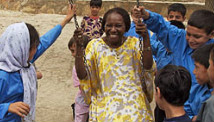Police have found charred human remains of what they suspect is ex-police officer Christopher Dorner, accused of several killings in the Los Angeles area. But during the manhunt for the ex-cop, police received eyewitness reports of the ex-cop in dozens of places around Southern California in the past few days.
Heavily armed police officers descended on a Kentucky Fried Chicken outlet in Tarzana after a tipster said Dorner might be inside; the police arrested one innocent African-American man who barely resembled Dorner, soon releasing him.
Dorner was soon spotted at a Lowe’s home improvement store in Northridge, causing the outlet to be evacuated and a SWAT team to be dispatched, but the suspect wasn’t there either; he was also reported at Men’s Central Jail in downtown Los Angeles, and so on. At last report, Dorner was said to be in the San Bernardino Mountains — where he was ultimately found at Big Bear — though tips continued to place him elsewhere.
The public can often play an instrumental role in helping find missing persons; it is how Elizabeth Smart was eventually recovered after being abducted from her Salt Lake City home in 2002. But such tips can also be completely wrong. [Mistaken Identity? 10 Contested Death Penalty Cases]
In 2002 two snipers attacked the Washington, D.C., area and terrorized much of the public. Based upon eyewitness descriptions, law enforcement agencies alerted people to look out for suspects in a white van. Thousands of vehicles were stopped and searched, jamming highways for miles. The focus on a white van intensified after a shooting outside a store in suburban Virginia, when a man claimed to have seen the killer standing next to such a vehicle. The witness later admitted that he lied to police, likely seeking media attention.
While some false sightings are pranks meant to get attention, most come from sincere eyewitnesses trying to help out. Elvis Presley-sighting jokes aside, these reports pose a real problem for police. It is not uncommon, especially in high-profile hunts for fugitives or missing persons, for dozens or hundreds of sightings to be reported to law enforcement. Police, of course, must treat all sightings and reports as potential leads; ignoring a valid tip might cost lives.
The many false sightings of Dorner were not unique. One of the most famous cases of false sightings occurred with the disappearance of a 3-year-old British girl named Madeleine McCann, last seen at a resort in Portugal in May 2007. Her presumed abduction made international news, and photos of McCann circulated widely as police and the girl’s family hoped for tips from the public. This led to McCann being “sighted” in dozens of different places in Europe and around the world, from Belgium to Brazil, Australia to Africa, by eyewitnesses who reported the girl.
All of this has implications for psychology and eyewitness reliability; if you tell people what to look for, any face or physique that is even remotely similar (large black male, small blonde girl) can become a (false)-positive identification. By some estimates, as many as one-third of eyewitness identifications in criminal cases are wrong, and nearly 200 people who were convicted of crimes based on positive eyewitness identifications were later exonerated through DNA evidence.
In the Dorner case, the $ 1 million reward offered for information that led to his capture understandably increased the public’s incentive for reporting all potential sightings.
Benjamin Radford is deputy editor of “Skeptical Inquirer” science magazine and author of six books including “Media Mythmakers: How Journalists, Activists, and Advertisers Mislead Us.” His Web site is www.BenjaminRadford.com.
Copyright 2013 LiveScience, a TechMediaNetwork company. All rights reserved. This material may not be published, broadcast, rewritten or redistributed.
Science News Headlines – Yahoo! News
Title Post: Ex-Cop Dorner ‘Sightings’ Highlight Problems with Eyewitnesses
Url Post: http://www.news.fluser.com/ex-cop-dorner-sightings-highlight-problems-with-eyewitnesses/
Link To Post : Ex-Cop Dorner ‘Sightings’ Highlight Problems with Eyewitnesses
Rating:
100%
based on 99998 ratings.
5 user reviews.
Author:
Thanks for visiting the blog, If any criticism and suggestions please leave a comment


